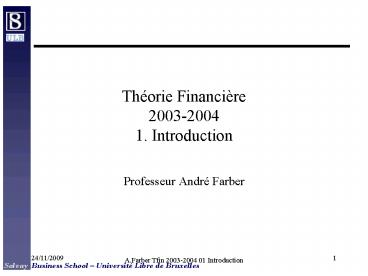Thorie Financire 20032004 1. Introduction
1 / 19
Title: Thorie Financire 20032004 1. Introduction
1
Théorie Financière2003-20041. Introduction
- Professeur André Farber
2
Organisation du cours
- Ouvrage de référence
- Brealey, R. and Myers, S.
- Principle of Corporate Finance
- 7th ed., McGraw-Hill 2003
- Site web www.ulb.ac.be/cours/solvay/farber
- Copie des transparents (PowerPoint)
- Glossaire anglais - français
- Notes pédagogiques
- Exercices
- Anciens examens
- Liens vers dautres sites
- Cas
- Examen(s)
3
Cas
- 2 cas
- Groupe de maximum 5 étudiants
- Solution écrite
- 20 de la cote finale
- Discussion du cas en groupes
4
Plan du cours
- 1. Introduction
- 2. Valeur actuelle
- 3. Cash flows, planning financier
- 4. Evaluation dentreprises
- 5,6. Analyse de projets dinvestissement
- 7,8. Rentabilité attendue et risque
- 9,10. Options
- 11, 12. Evaluation et financement
5
What is Corporate Finance?
- INVESTMENT DECISIONS Which REAL ASSETS to buy ?
- Real assets will generate future cash flows to
the firm - Intangible assets RD, Marketing, ..
- Tangible assets Real estate, Equipments,..
- Current assets Inventories, Account
receivables,.. - FINANCING DECISIONS Which FINANCIAL ASSET to
sell ? - Financial assets claims on future cash flows
- Debt promise to repay a fixed amount
- Equity residual claim
- DIVIDEND DECISION How much to return to
stockholders?
6
Accounting View of the Firm
- Balance sheet
- Income statement
- Sales
- Operating expenses
- Earnings before interest and taxes (EBIT)
- Interest expenses
- Taxes
- Net income (earnings after taxes)
- Retained earnings
- Dividend payments
Net Working Capital
Current liabilites
Current assets
Long-term debt
Fixed assets
Shareholders equity
7
Cash Flows between the Firm and the Financial
Markets
Firm issue securities
Firm invest
Firm
Financial markets
Investors
Cash flow from operations
Dividend and debt payments
Timing of cash flows uncertainty
8
Financial markets
- Primary markets
- Secundary markets
- Stock exchanges
- Over-The-Counter (OTC)
- Direct financing
- Intermediate financing banks, insurance companies
9
Market values
Market value of equity
Equity
Total capital employed
Cash flow
Market value of debt
Debt
10
Value creation
- Market value added (MVA)
- Market value of the firms capital Total
capital employed - VALUE CREATION 2 strategies
- Strategy 1
- Buy assets at a cost lower than the value of the
future revenues - real assets
- financial assets
- Strategy 2
- Sell financial assets for a price higher than the
value of future payments
Market value of equity Market value of debt
Stockholders equity Financial debt
11
The Capital Investment Trade-off
- The firm can always give cash back to the
shareholders - Capital employed by the firm has an opportunity
cost - The opportunity cost of capital is the expected
rate of return offered by equivalent investments
in the capital market - The weighted average cost of capital (WACC) is
the (weighted) average of the cost of equity and
of the cost of debt
?
Investment opportunities in capital markets
Project
?Cash?
Stockholder
12
Economic Value Added (EVA)
- EVA Earnings after tax WACC ? Total capital
Example Equity 10bDebt 10bTotal
capital 20b EBIT 2.5bTax rate 40WACC 11
EVA calculation Earnings after tax 2.5b
(1-0.40) 1.5b EVA 1.5b 11 ?
20b 1.5b 2.2b 700m
(EVA is explained RWJ Chapter 12 Appendix)
13
How to measure value creation ?
- 1. Compare market value of equity to book value
- Value creation if M/B gt 1
- 2. Compare return on equity to the opportunity
cost of equity - Value creation if ROE gt Opportunity Cost of
Equity
14
M/B vs ROE
- Simplifying assumptions
- Expected net income income constant
- Net income dividend
- Market value determination
- Net income Expected return ? Market value of
equity - NI r ?
MVeq - ROE (definition)
- Return on equity Net income / Book value of
equity - ROE NI /
BVeq - r ? MVeq / Bveq
- Conclusion in this simplified setting,
- M/B MVeq/BVeq gt 1 ? ROEgt r
15
Value creation Example
- Data
- Book value of equity 10 b
- Net income 2 b / year
- Cost of equity r 10
- Return on equity ROE 2 / 10 20 gt 10
- EVA 2 10 10 1 b / year
- Market value of equity NI / r 2 / 10 20
b - Market value added MVA 20 10 10 b
- Market to Book M/B 20 / 10 2
16
The Top Companies 2003
SourceBusiness Week, July 14 2003
17
The Top Companies 2002
18
QD financial analysis
- PROFITABILITY (du Pont system)
- Three determinants
17.1
Financial Leverage
Asset Turnover
Profit Margin
- Microsoft - 2003 US bil.
- Net Income 7,829
- Sales 28,365
- Assets 67,646
- Book equity 45,784
27.6
0.42
1.48
19
References
- Corporate finance textbooks (MBA level)
- Brealey, Richard and Steward Myers, Principles of
Corporate Finance, xth edition, McGraw-Hill 2000 - Ross, Stephen A., Randolph W. Westerfield and
Jeffrey F. Jaffe, Corporate Finance, 6th edition,
McGraw-Hill Irwin 2002 - Damorada, Aswath, Corporate Finance Theory and
Practice, Wiley 1997 - Ouvrages de référence en français
- Bodie, Z. et Merton, R. Finance (édition
française dirigée par C. Thibierge) Pearson
education 2000 - Corporate finance texts for executives
- Bertoneche, Marc and Rory Knight, Financial
Performance, Butterworth Heinemann 2001 - Hawawini, Gabriel and Claude Viallet, Finance for
Executives Managing for Value Creation,
South-Western College Publishing, 1999































